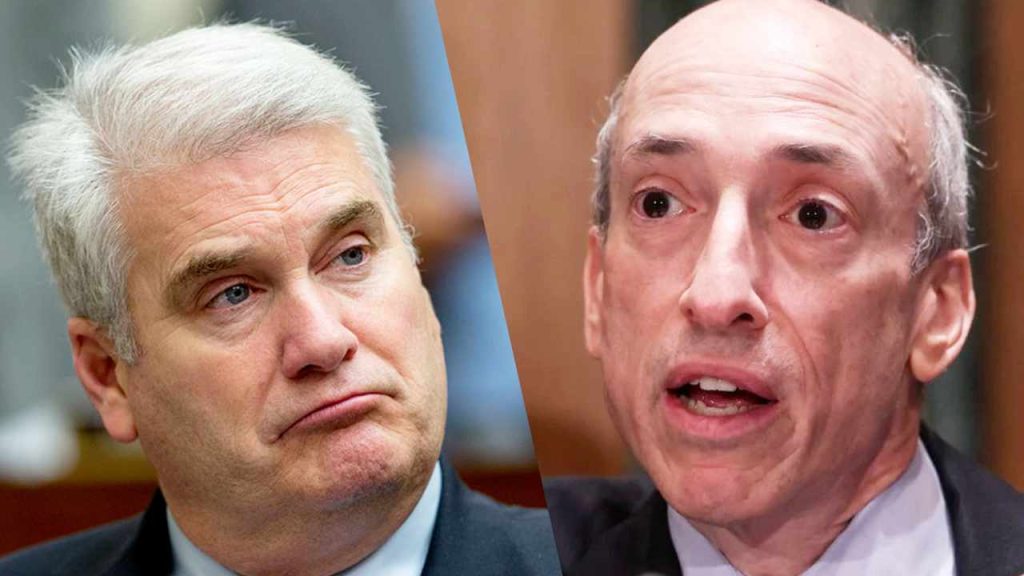FTX Collapse Isn’t a Crypto Failure — It’s a Failure of SEC, Bankman-Fried, Centralized Finance – Regulation Bitcoin News

U.S. Congressman Tom Emmer says the FTX meltdown is not a crypto failure but a failure with SEC Chairman Gary Gensler, former FTX CEO Sam Bankman-Fried, and centralized finance. “We need to get to the bottom of this. We need to understand why Gary Gensler and the SEC were not doing their job,” the lawmaker stressed.
Rep. Emmer Says FTX Fallout Isn’t a Crypto Failure
U.S. Congressman Tom Emmer (R-MN) stated Tuesday that the implosion of cryptocurrency exchange FTX is not a crypto failure. Instead, he said it is a failure with centralized finance (cefi), Securities and Exchange Commission (SEC) Chairman Gary Gensler, and former FTX CEO Sam Bankman-Fried.
The lawmaker tweeted:
FTX’s collapse is not a crypto failure. It’s a failure with cefi, Gary Gensler, and Sam Bankman-Fried. Decentralization is the point.
In an interview with Fox Business Tuesday, Emmer further described the FTX meltdown as a failure of “business ethics,” “government oversight,” and “regulatory procedures.”
He proceeded to reference reports that the SEC met with Bankman-Fried in March and was allegedly working to give FTX special treatment. The lawmaker confirmed that his office is looking into the matter.
Emmer added that Bankman-Fried also pushed for “special treatment legislation through Congress.” However, when the former FTX CEO’s proposal was finally revealed, the crypto industry immediately raised multiple red flags. The lawmaker emphasized:
It’s a failure, it appears, of Gary Gensler to actually deal with the bad guys.
The congressman pointed out that Gensler was never there to deal with Celsius Network and Voyager Digital when they had to file for bankruptcy earlier this year, just like he was not there to deal with FTX. He was also not there to deal with terra/luna when the cryptocurrency collapsed in May, Emmer said.
Dealing with bad actors “is exactly what he [Gensler] is supposed to be doing,” the congressman exclaimed, stressing:
What is the regulator responsible for this doing, going after good actors in the community, and working backroom deals, it appears, with people who’s doing nefarious things.
“We need to get to the bottom of this. We need to understand why Gary Gensler and the SEC were not doing their job,” Congressman Emmer emphasized. “We need to understand how this was allowed to get to the point where people and their savings are getting hurt. That’s exactly what the regulator’s supposed to be taking care of.”
The lawmaker noted that regulators are going after decentralized finance (defi). “This is not what it’s about,” he cautioned, concluding:
It’s not about the crypto industry. This is about Sam Bankman-Fried. It’s about the regulator, Gary Gensler, and it’s about centralized finance, which needs to be brought under a regulatory umbrella. Gary Gensler has done nothing to make that happen.
Emmer is not the only one who has warned about centralized finance. Ethereum co-founder Vitalik Buterin similarly said that “centralized anything is by default suspect.” Investment firm Paradigm co-founder Matt Huang explained: “The issues at FTX are precisely ones that decentralized finance can solve through increased transparency and security.” Moreover, Shark Tank star and the owner of the NBA team Dallas Mavericks, Mark Cuban, said that recent failures of crypto companies are not crypto-specific.
The congressman from Minnesota has repeatedly criticized Gensler for his approach to regulation. In June, he slammed the securities watchdog for not regulating in good faith, stating that “Under Chair Gensler, the SEC has become a power-hungry regulator.”
Do you agree with Congressman Tom Emmer? Let us know in the comments section below.
Image Credits: Shutterstock, Pixabay, Wiki Commons
Disclaimer: This article is for informational purposes only. It is not a direct offer or solicitation of an offer to buy or sell, or a recommendation or endorsement of any products, services, or companies. Bitcoin.com does not provide investment, tax, legal, or accounting advice. Neither the company nor the author is responsible, directly or indirectly, for any damage or loss caused or alleged to be caused by or in connection with the use of or reliance on any content, goods or services mentioned in this article.













